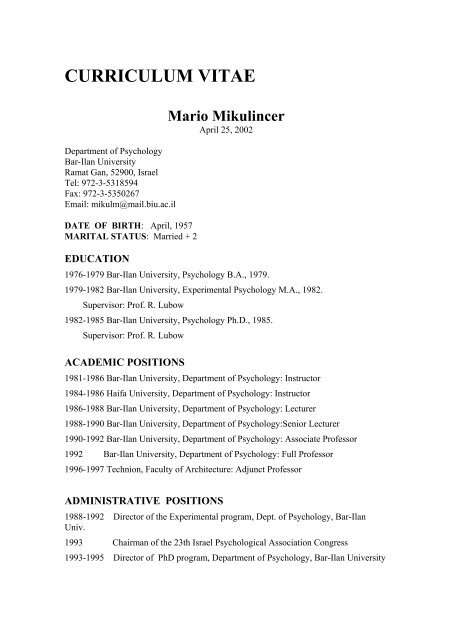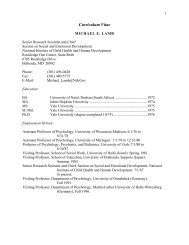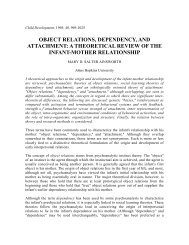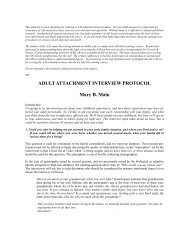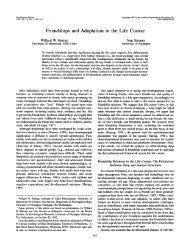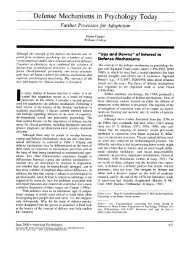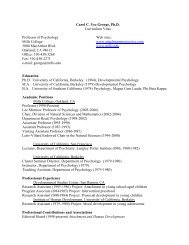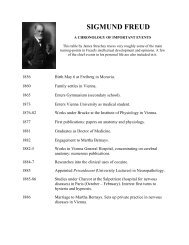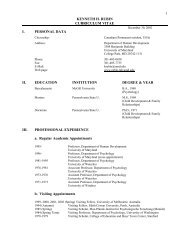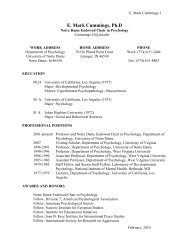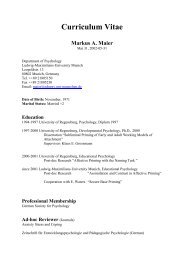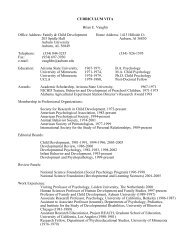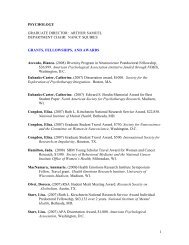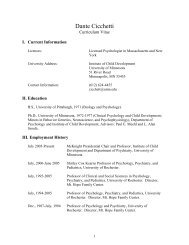Mario Mikulincer - Psychology Department @ SUNY Stony Brook
Mario Mikulincer - Psychology Department @ SUNY Stony Brook
Mario Mikulincer - Psychology Department @ SUNY Stony Brook
Create successful ePaper yourself
Turn your PDF publications into a flip-book with our unique Google optimized e-Paper software.
CURRICULUM VITAE<br />
<strong>Department</strong> of <strong>Psychology</strong><br />
Bar-Ilan University<br />
Ramat Gan, 52900, Israel<br />
Tel: 972-3-5318594<br />
Fax: 972-3-5350267<br />
Email: mikulm@mail.biu.ac.il<br />
DATE OF BIRTH: April, 1957<br />
MARITAL STATUS: Married + 2<br />
EDUCATION<br />
<strong>Mario</strong> <strong>Mikulincer</strong><br />
April 25, 2002<br />
1976-1979 Bar-Ilan University, <strong>Psychology</strong> B.A., 1979.<br />
1979-1982 Bar-Ilan University, Experimental <strong>Psychology</strong> M.A., 1982.<br />
Supervisor: Prof. R. Lubow<br />
1982-1985 Bar-Ilan University, <strong>Psychology</strong> Ph.D., 1985.<br />
Supervisor: Prof. R. Lubow<br />
ACADEMIC POSITIONS<br />
1981-1986 Bar-Ilan University, <strong>Department</strong> of <strong>Psychology</strong>: Instructor<br />
1984-1986 Haifa University, <strong>Department</strong> of <strong>Psychology</strong>: Instructor<br />
1986-1988 Bar-Ilan University, <strong>Department</strong> of <strong>Psychology</strong>: Lecturer<br />
1988-1990 Bar-Ilan University, <strong>Department</strong> of <strong>Psychology</strong>:Senior Lecturer<br />
1990-1992 Bar-Ilan University, <strong>Department</strong> of <strong>Psychology</strong>: Associate Professor<br />
1992 Bar-Ilan University, <strong>Department</strong> of <strong>Psychology</strong>: Full Professor<br />
1996-1997 Technion, Faculty of Architecture: Adjunct Professor<br />
ADMINISTRATIVE POSITIONS<br />
1988-1992 Director of the Experimental program, Dept. of <strong>Psychology</strong>, Bar-Ilan<br />
Univ.<br />
1993 Chairman of the 23th Israel Psychological Association Congress<br />
1993-1995 Director of PhD program, <strong>Department</strong> of <strong>Psychology</strong>, Bar-Ilan University
1993-1995 Deputy-Head, <strong>Department</strong> of <strong>Psychology</strong>, Bar-Ilan University<br />
1995-1999 Head, <strong>Department</strong> of <strong>Psychology</strong>, Bar-Ilan University<br />
2001- Chair, Interdisciplinary Studies Committee, Bar-Ilan University<br />
RESEARCH POSITIONS<br />
1982-1991 Mental Health <strong>Department</strong>., Israel Defense Forces: Senior Researcher<br />
1986-1989 Sleep deprivation laboratory, Israel Ministry of Defense: Senior Researcher<br />
1993-1996 Casualties <strong>Department</strong>, Israel Defense Forces: Senior Researcher<br />
PROFESSIONAL MEMBERSHIP<br />
Society for Personality and Social <strong>Psychology</strong>, Fellow<br />
EDITORIAL BOARD<br />
2002- Journal of Personality<br />
2000- Journal of Personality and Social <strong>Psychology</strong>: PPID<br />
2002- Journal of Personality and Social <strong>Psychology</strong>: IRGP<br />
2002- Personality and Social <strong>Psychology</strong> Bulletin<br />
AD-HOC REVIEWER (Journals)<br />
Anxiety, Stress, and, Coping<br />
Applied <strong>Psychology</strong><br />
British Journal of Social <strong>Psychology</strong><br />
British Journal of Clinical <strong>Psychology</strong><br />
Canadian Journal of Behavioral Sciences<br />
Cognition and Emotion<br />
Death Studies<br />
European Journal of Oral Sciences<br />
European Journal of Personality<br />
European Journal of Social <strong>Psychology</strong><br />
Gut<br />
Journal of Applied Social <strong>Psychology</strong><br />
Journal of Clinical and Social <strong>Psychology</strong><br />
Journal of Consulting and Clinical <strong>Psychology</strong><br />
Journal of Cross-Cultural <strong>Psychology</strong><br />
Journal of Experimental <strong>Psychology</strong>: Applied
Journal of Experimental <strong>Psychology</strong>: General<br />
Journal of Occupational <strong>Psychology</strong><br />
Journal of Personality<br />
Journal of Personality and Social <strong>Psychology</strong>: ASC<br />
Journal of Personality and Social <strong>Psychology</strong>: IRGP<br />
Journal of Personality and Social <strong>Psychology</strong>: PPID<br />
Journal of Social and Personal Relationships<br />
Motivation and Emotion<br />
Personality and Individual Differences<br />
Personality and Social <strong>Psychology</strong> Bulletin<br />
Psychologia (hebrew)<br />
Psychological Bulletin<br />
Psychological Science<br />
Society and Welfare (Hebrew)<br />
Social Cognition<br />
AD-HOC REVIEWER (Grants)<br />
Israeli Academy of Sciences<br />
Ford Foundation<br />
Grant Foundation<br />
Israeli Health Ministry<br />
Israeli Education Ministry<br />
Israeli Cancer Foundation.<br />
National Science Foundation<br />
RESEARCH INTERESTS<br />
Attachment styles in adulthood; Terror Management theory, Personality processes in<br />
interpersonal relationships; Evolutionary psychology, Human learned helplessness and<br />
depression; Trauma and Post-traumatic processes; Coping with stress; Qualitative<br />
research of emotional states; Mental rumination and self-focused attention<br />
PUBLICATIONS<br />
BOOKS<br />
<strong>Mikulincer</strong>, M. (1994). Human learned helplessness: A coping perspective. New York:<br />
Plenum Press.<br />
CHAPTERS IN BOOKS<br />
Babkoff, H., <strong>Mikulincer</strong>, M., Caspy, T., & Sing, H. (1992). Selected problems of<br />
analysis and interpretation of the effects of sleep deprivation on performance
hythms. In Friedman, D., & Bruder, G. E. (Eds.), Psychophysiology and<br />
experimental psychopathology: A tribute to Samuel Sutton (pp. 93-110). New<br />
York: New York Academy of Science.<br />
<strong>Mikulincer</strong>, M. (1996). Mental rumination and learned helplessness: Cognitive shifts<br />
during helplessness training and their behavioral consequences. In Sarason, I.,<br />
Sarason, B., & Pierce, G. (eds.), Cognitive interference: Theories, methods, and<br />
findings (pp. 191-210). Hillsdale, NJ: Lawrence Erlbaum.<br />
<strong>Mikulincer</strong>, M., & Florian, V. (1996). Coping and adaptation to trauma and loss. In<br />
Zeidner, M., & Endler, N. (eds.), Handbook of coping (pp. 554-572). New York:<br />
Wiley.<br />
<strong>Mikulincer</strong>, M., & Florian, V. (1996). Emotional reactions to loss over the life span: An<br />
attachment perspective. In McFadden, S., & Magai, C. (ed.) Handbook of<br />
emotions, adult development, and aging (pp. 269-285). New York: Academic<br />
Press.<br />
<strong>Mikulincer</strong>, M., & Florian, V. (1998). The relationship between adult attachment styles<br />
and emotional and cognitive reactions to stressful events. In Simpson, J., & Rholes,<br />
S. (eds.,) Attachment theory and close relationships (pp. 143-165). New York:<br />
Guilford.<br />
<strong>Mikulincer</strong>, M. (2000). Personal Dependency. In E. F. Borgatta, & R. J. V.<br />
Montgomery. (eds.), Encyclopedia of Sociology (second edition, Vol. 3, pp. 2062-<br />
2069). New York: MacMillan Reference.<br />
<strong>Mikulincer</strong>, M., & Florian, V. (2001). Attachment style and affect regulation –<br />
Implications for coping with stress and mental health. In Fletcher, G., & Clark, M.<br />
(eds.), Blackwell handbook of social psychology: Interpersonal Processes (pp. 537-<br />
557). Oxford, UK: Blackwell Publishers<br />
<strong>Mikulincer</strong>, M. (in press). Folk theories of emotion. In Levinson, D., Ponzetti, J., &<br />
Jorgensen, P. (eds.), Encyclopedia of Human Emotions. New York: MacMillan<br />
Reference.<br />
<strong>Mikulincer</strong>, M. (in press). Attachment in adult psychological development. In<br />
Eisenberg, N. (ed.), The International Encyclopedia of the Social and Behavioral<br />
Sciences. London, UK: Elsevier.<br />
Shaver, P. R., & <strong>Mikulincer</strong>, M. (in press). The Psychodynamics of Social Judgments:<br />
An Attachment Theory Perspective. In Forgas, J. P., Williams, K. D., & von<br />
Hippel, W. (eds.), Responding to the social world: Implicit and explicit processes<br />
in social judgments and decisions. London, UK: Cambridge University Press.<br />
ARTICLES (in refereed journals)<br />
Weisenberg M., Wolf Y., Mittwoch T., <strong>Mikulincer</strong> M., & Aviram O. (1985). Subject<br />
versus experimenter control in the reaction to pain. Pain, 23, 187-200.
<strong>Mikulincer</strong>, M. (1986). Attributional processes in the learned helplessness paradigm:<br />
The behavioral effects of globality attributions. Journal of Personality and Social<br />
<strong>Psychology</strong>, 51, 1248-1256.<br />
<strong>Mikulincer</strong>, M. (1986). Motivational involvement and learned helplessness: The<br />
behavioral effects of the importance of uncontrollable events. Journal of Social and<br />
Clinical <strong>Psychology</strong>, 4, 402-422.<br />
<strong>Mikulincer</strong>, M., & Caspy, T. (1986). The conceptualization of helplessness: I. A<br />
phenomenological-structural analysis . Motivation and Emotion, 10, 263-278.<br />
<strong>Mikulincer</strong>, M., & Caspy, T. (1986). The conceptualization of helplessness: II.<br />
Laboratory correlates of the phenomenological definition of helplessness.<br />
Motivation and Emotion, 10, 279-294.<br />
Solomon, Z., <strong>Mikulincer</strong>, M., & Hobfoll, S. E. (1986). The effects of social support and<br />
battle intensity on loneliness and breakdown during combat. Journal of Personality<br />
and Social <strong>Psychology</strong>, 51, 1269-1276.<br />
Solomon, Z., & <strong>Mikulincer</strong>, M. (1987). Combat stress reactions, post traumatic stress<br />
disorder and somatic complaints among Israeli soldiers. Journal of Psychosomatic<br />
Research, 31, 131-137.<br />
Solomon, Z., & <strong>Mikulincer</strong>, M. (1987). Combat stress reactions, post-traumatic stress<br />
disorder and social adjustment--A study of Israeli veterans. The Journal of Nervous<br />
and Mental Disease, 175, 277-285.<br />
Solomon, Z., <strong>Mikulincer</strong>, M., & Hobfoll, S. E. (1987). Objective versus subjective<br />
measurement of stress and social support: The case of combat-related reactions.<br />
Journal of Consulting and Clinical <strong>Psychology</strong>, 55, 577-583.<br />
Solomon, Z., <strong>Mikulincer</strong>, M., & Kotler, M. (1987). A two year follow-up of somatic<br />
complaints among Israeli combat stress reaction casualties. Journal of<br />
Psychosomatic Research, 31, 463-469.<br />
Solomon, Z., <strong>Mikulincer</strong>, M., & Jacob, B. R. (1987). Exposure to recurrent combat<br />
stress: combat stress reactions among Israeli soldiers in the Lebanon war.<br />
Psychological Medicine, 17, 433-440.<br />
Solomon, Z., <strong>Mikulincer</strong>, M., Freid, B., Wosner, Y. (1987). Family characteristics and<br />
posttraumatic stress disorder -- A follow-up of Israeli combat stress reaction<br />
casualties. Family Processes, 26, 383-394.<br />
Solomon, Z., Weisenberg, M., Schwarzwald, J., & <strong>Mikulincer</strong>, M. (1987). Posttraumatic<br />
stress disorder among frontline soldiers with combat stress reaction: The<br />
1982 Israeli experience. American Journal of Psychiatry, 144, 448-454.<br />
Solomon, Z., Weisenberg, M., Schwarzwald, J., & <strong>Mikulincer</strong>, M. (1987). Posttraumatic<br />
stress disorder among soldiers with combat stress reaction: The 1982<br />
Israeli experience. Megamot, 30, 219-229<br />
Schwarzwald, J., Solomon, Z., Weisenberg, M., & <strong>Mikulincer</strong>, M. (1987). Validation of<br />
the impact of event scale for psychological sequelae of combat. Journal of<br />
Consulting and Clinical <strong>Psychology</strong>, 55, 251-256.
Weisenberg, M., Solomon, Z., Schwarzwald, J., & <strong>Mikulincer</strong>, M. (1987). Assessing<br />
severity of post-traumatic stress disorder: The relationship between dichotomous<br />
and continuous measures. Journal of Consulting and Clinical <strong>Psychology</strong>, 55, 432-<br />
434.<br />
Keinan, G , <strong>Mikulincer</strong>, M., & Ribnytzki, A. (1988). Perception of self and parents by<br />
second generation Holocaust survivors. Behavioral Medicine, 14, 6-12.<br />
<strong>Mikulincer</strong>, M. (1988). Reactance and helplessness following exposure to unsolvable<br />
problems: The effects of attributional style. Journal of Personality and Social<br />
<strong>Psychology</strong>, 54, 679-686.<br />
<strong>Mikulincer</strong>, M. (1988). The relationship of probability of success and performance<br />
following unsolvable problems: Reactance and helplessness effects. Motivation<br />
and Emotion, 12, 139-154.<br />
<strong>Mikulincer</strong>, M. (1988). The relation between stable/unstable attribution and learned<br />
helplessness. British Journal of Social <strong>Psychology</strong>, 27, 221-230.<br />
<strong>Mikulincer</strong>, M. (1988). Freedom of choice, control, and learned helplessness. Journal of<br />
Clinical and Social <strong>Psychology</strong>, 7,203-213<br />
<strong>Mikulincer</strong>, M. (1988). A case study of three theories of learned helplessness: The role<br />
of test importance. Motivation and Emotion, 12, 371-384.<br />
<strong>Mikulincer</strong>, M., & Nizan , B. (1988). Causal attribution, cognitive interference and the<br />
generalization of learned helplessness. Journal of Personality and Social<br />
<strong>Psychology</strong>, 55, 470-478.<br />
<strong>Mikulincer</strong>, M., & Solomon, Z. (1988). Attributional style and combat-related posttraumatic<br />
stress disorder. Journal of Abnormal <strong>Psychology</strong>, 97, 308-313.<br />
<strong>Mikulincer</strong>, M., Solomon, Z., & Benbenishty, R. (1988). Battle events, acute combat<br />
stress reaction and long term psychological sequelae of war. Journal of Anxiety<br />
Disorders, 2, 121-133.<br />
Solomon, Z., Benbenishty, R., & <strong>Mikulincer</strong>, M. (1988). A follow up of Israeli<br />
casualties of combat stress reaction ("battle shock") in the 1982 Lebanon War.<br />
British Journal of Clinical <strong>Psychology</strong>, 27, 125-136.<br />
Solomon, Z., Kotler, M., & <strong>Mikulincer</strong>, M. (1988). Combat related post-traumatic stress<br />
disorder among second generation Holocaust survivors: Preliminary findings.<br />
American Journal of Psychiatry, 145, 865-868.<br />
Solomon, Z., & <strong>Mikulincer</strong>, M. (1988). Psychological sequelae of war: A two year<br />
follow-up study of Israeli combat stress reaction casualties. The Journal of Nervous<br />
and Mental Disease, 176, 264-269.<br />
Solomon, Z., <strong>Mikulincer</strong>, M, & Avitzur, E. (1988). Coping, locus of control, social<br />
support, and combat-related post-traumatic stress disorder -- A prospective study.<br />
Journal of Personality and Social <strong>Psychology</strong>, 55, 279-285.<br />
Solomon, Z., <strong>Mikulincer</strong>, M., & Bleich, A. (1988). Characteristic expressions of posttraumatic<br />
stress disorder among Israeli soldiers in the 1982 Lebanon War. Journal<br />
of Human Stress, 14, 171-178.
Solomon, Z., & <strong>Mikulincer</strong>, M., Flum, H. (1988). Negative life events, coping<br />
responses, and combat-related psychopathology: A prospective study. Journal of<br />
Abnormal <strong>Psychology</strong>, 97, 302-307.<br />
Solomon, Z., Schwarzwald, J., Weisenberg, M., & <strong>Mikulincer</strong>, M. (1988). Combat<br />
stress reaction and post-traumatic stress disorder as determinants of perceived selfefficacy<br />
in battle. Journal of Clinical and Social <strong>Psychology</strong>, 6, 356-370.<br />
Solomon, Z., <strong>Mikulincer</strong>, M., & Benbenishty, R. (1989). Combat stress reaction -<br />
Clinical manifestations and correlates. Military <strong>Psychology</strong>, 1, 35-47.<br />
Babkoff, H., <strong>Mikulincer</strong>, M., Caspi, T., & Kempinski, D. (1988). The topology of<br />
performance curves during 72 hours of sleep loss: A memory and search task.<br />
Quarterly Journal of Experimental <strong>Psychology</strong>, 40A, 737-756.<br />
Lider, O., Wolf, Y., Silfan, P., & <strong>Mikulincer</strong>, M. (1988). Perception of the father as<br />
aggressor or victim among offsprings of Holocaust survivors. Crime and Social<br />
Deviance, 17, 51-70.<br />
Babkoff, H., <strong>Mikulincer</strong>, M., Caspi, T., & Sing, H. (1989). The implications of sleep<br />
loss for circadian performance accuracy. Work and Stress, 3, 3-14.<br />
<strong>Mikulincer</strong>, M. (1989). Learned helplessness and egotism: Effects of internal/external<br />
attribution on performance following unsolvable problems. British Journal of<br />
Social <strong>Psychology</strong>, 28, 17-29.<br />
<strong>Mikulincer</strong>, M. (1989). Self serving biases in the perception of freedom: The impact of<br />
previously experienced failures. Journal of <strong>Psychology</strong>, 123, 25-41.<br />
<strong>Mikulincer</strong>, M. (1989). Cognitive interference and learned helplessness: The effects of<br />
off-task cognitions on performance following unsolvable problems. Journal of<br />
Personality and Social <strong>Psychology</strong>, 57, 129-135.<br />
<strong>Mikulincer</strong>, M. (1989). Coping and learned helplessness: Effects of coping strategies on<br />
performance following unsolvable problems. European Journal of Personality, 3,<br />
181-194.<br />
<strong>Mikulincer</strong>, M. (1989). Causal attribution, coping strategies, and learned helplessness.<br />
Cognitive Therapy and Research,13, 565-582.<br />
<strong>Mikulincer</strong>, M., Babkoff, H., Caspi, T., & Sing, H. (1989). The effects of 72 hours of<br />
sleep loss on psychological variables. British Journal of <strong>Psychology</strong> , 80, 145-<br />
162.<br />
<strong>Mikulincer</strong>, M., Glaubman, H., Wasserman, O., Porat, A., & Birger, M. (1989). Control<br />
beliefs and sleep characteristics of posttraumatic stress disorder patients.<br />
Psychological Reports, 65, 567-576.<br />
<strong>Mikulincer</strong>, M., Kedem, P., & Zilcha-Segal, H. (1989). Learned helplessness, reactance,<br />
and cue utilization. Journal of Research in Personality, 23, 235-247.<br />
<strong>Mikulincer</strong>, M., & Solomon, Z. (1989). Causal attribution, coping strategies, and<br />
combat-related posttraumatic stress disorder. European Journal of Personality, 3,<br />
269-284.
Segal, Y., & <strong>Mikulincer</strong>, M. (1989). The experience of loneliness: A<br />
phenomenological-structural analysis. Psychologia, 1, 85-94.<br />
Solomon, Z., Avitzur, E., & <strong>Mikulincer</strong>, M. (1989). Coping resources and social<br />
functioning following combat stress reaction : A longitudinal study. Journal of<br />
Social and Clinical <strong>Psychology</strong>, 8, 87-96:<br />
Solomon, Z., <strong>Mikulincer</strong>, M., & Benbenishty, R. (1989). Locus of control and combatrelated<br />
post traumatic stress disorder: The intervening role of battle intensity, threat<br />
appraisal, and coping. British Journal of Clinical <strong>Psychology</strong>, 28, 131-144.<br />
Solomon, Z., & <strong>Mikulincer</strong>, M., & Flum, H. (1989). The implications of life events and<br />
social integration in the course of combat-related post-traumatic stress disorder.<br />
Social Psychiatry, 24, 41-48.<br />
Dorshav, N., & <strong>Mikulincer</strong>, M. (1990). Learned helplessness, causal attribution, and<br />
responses to frustration. Journal of General <strong>Psychology</strong>, 117, 47-58.<br />
Glaubman, H., <strong>Mikulincer</strong>, M., Wasserman, O., Porat, A., & Birger, M. (1990). Sleep of<br />
chronic posttraumatic patients. Journal of Traumatic Stress, 3, 255-263.<br />
Kedem, P., <strong>Mikulincer</strong>, M., Nathenson, Y. E., & Bartoov, B. (1990). Psychological<br />
aspects of male infertility. British Journal of Medical <strong>Psychology</strong>, 63, 73-80.<br />
<strong>Mikulincer</strong>, M. (1990). The joint influence of prior beliefs and current situational<br />
information on stable/unstable attribution. Journal of Social <strong>Psychology</strong>, 130, 739-<br />
754.<br />
<strong>Mikulincer</strong>, M., Babkoff, H., Caspy, T., & Weiss, H. (1990). The impact of cognitive<br />
interference on performance during prolonged sleep loss. Psychological Research,<br />
52, 80-86.<br />
<strong>Mikulincer</strong>, M., Florian, V., & Tolmacz, R. (1990). Attachment styles and fear of death:<br />
A case of affect regulation. Journal of Personality and Social <strong>Psychology</strong>, 58, 273-<br />
280.<br />
<strong>Mikulincer</strong>, M., Gerber, H., & Weisenberg, M. (1990). Judgments of control and<br />
depression: The role of self-esteem threat and self-focused attention. Cognitive<br />
Therapy and Research, 14, 589-608.<br />
<strong>Mikulincer</strong>, M., Kedem, P., & Paz, D. (1990). The impact of trait anxiety and<br />
situational stress on the categorization of natural objects. Anxiety Research, 2, 85-<br />
101.<br />
<strong>Mikulincer</strong>, M., Kedem, P., & Paz, D. (1990). Anxiety and categorization: 1. The<br />
structure and boundaries of mental categories. Personality and Individual<br />
Differences, 11, 805-814.<br />
<strong>Mikulincer</strong>, M., Paz, D., & Kedem, P. (1990). Anxiety and categorization: 2.<br />
Hierarchical levels of mental categories. Personality and Individual Differences,<br />
11, 815-821.<br />
<strong>Mikulincer</strong>, M., & Segal, J. (1990). A multidimensional analysis of the experience of<br />
loneliness. Journal of Social and Personal Relationships, 7, 209-230.
Mittwoch, T., Weisenberg, M., & <strong>Mikulincer</strong>, M. (1990). The influence of warning<br />
signal timing and cognitive preparation on the aversiveness of electric shock. Pain,<br />
42, 373-381.<br />
Solomon, Z., Avitzur, E., & <strong>Mikulincer</strong>, M. (1990). Coping styles and postwar<br />
psychopathology among Israeli soldiers. Personality and Individual Differences, 5,<br />
451-456.<br />
Solomon, Z., <strong>Mikulincer</strong>, M, & Habershaim, N. (1990). Life events, coping strategies,<br />
social resources, and somatic complaints among combat stress reaction casualties.<br />
British Journal of Medical <strong>Psychology</strong>, 63, 137-148.<br />
Solomon, Z., Waysman, M, & <strong>Mikulincer</strong>, M. (1990). Family functioning, perceived<br />
societal support and combat-related psychopathology: The moderating role of<br />
loneliness. Journal of Social and Clinical <strong>Psychology</strong>, 9, 456-472.<br />
Weisenberg, M., Wolf, Y., Mittwoch, T., & <strong>Mikulincer</strong>, M. (1990). Learned<br />
resourcefulness and perceived control of pain: A preliminary examination of<br />
construct validity. Journal of Research in Personality, 24, 101-110.<br />
Solomon, Z., & <strong>Mikulincer</strong>, M. (1990). Life events and combat-related posttraumatic<br />
stress disorder: The intervening role of locus of control and social support. Military<br />
<strong>Psychology</strong>, 2, 241-256.<br />
Babkoff, H., Caspy, T., & <strong>Mikulincer</strong>, M. (1991). Subjective sleepiness ratings: The<br />
effects of sleep deprivation, circadian rhythmicity and cognitive performance.<br />
Sleep, 14, 534-539.<br />
Babkoff, H., Caspy, T., <strong>Mikulincer</strong>, M., & Sing, H. (1991). Monotonic and rhythmic<br />
influences: A challenge for sleep deprivation research. Psychological Bulletin, 109,<br />
411-428.<br />
Bleich, A., Grinshpoon, A., Solomon, Z., <strong>Mikulincer</strong>, M., Isaacs, J., & Kotler, M.<br />
(1991). Evaluating parachute-drop stress by measuring blood lipids. Harefuah,<br />
120, 313-317.<br />
<strong>Mikulincer</strong>, M., Bizman, A., & Aizenberg, R. (1991). An attributional analysis of<br />
social-comparison jealousy. Motivation and Emotion, 13, 235-258.<br />
<strong>Mikulincer</strong>, M., & Erev, I. (1991). Attachment style and the structure of romantic love.<br />
British Journal of Social <strong>Psychology</strong>, 30, 273-291.<br />
<strong>Mikulincer</strong>, M., Glaubman, H., Ben-Artzi, E., & Grossman, S. (1991). The cognitive<br />
specificity of learned helplessness and depression deficits: The role of self-focused<br />
cognitions. Anxiety Research, 3, 273-290.<br />
<strong>Mikulincer</strong>, M., & Marshand, O. (1991). An excuse perspective of the learned<br />
helplessness paradigm: The self-protective role of causal attribution. Journal of<br />
Social and Clinical <strong>Psychology</strong>, 10, 134-151.<br />
<strong>Mikulincer</strong>, M., & Nachshon, O. (1991). Attachment styles and patterns of selfdisclosure.<br />
Journal of Personality and Social <strong>Psychology</strong>, 61, 321-332.<br />
<strong>Mikulincer</strong>, M., & Peer-Golding, I. (1991). Self-congruence and the experience of<br />
happiness. British Journal of <strong>Psychology</strong>, 30, 21-35.
<strong>Mikulincer</strong>, M., & Segal, J. (1991). Loneliness and the desire for intimacy: The<br />
intervening role of locus of control. Personality and Individual Differences, 12,<br />
801-809.<br />
<strong>Mikulincer</strong>, M., Yinon, A., & Kabili, D. (1991). Epistemic needs and learned<br />
helplessness. European Journal of Personality, 5, 249-258.<br />
Solomon, Z., Benbenishti, R., & <strong>Mikulincer</strong>, M. (1991). The contribution of wartime,<br />
pre-war, and post-war factors to self-efficacy: A longitudinal study of combat<br />
stress reactions. Journal of Traumatic Stress, 4, 345-362.<br />
Solomon, Z., <strong>Mikulincer</strong>, M., & Arad, R. (1991). Monitoring and blunting: Implications<br />
for combat-related posttraumatic stress disorder. Journal of Traumatic Stress, 4,<br />
209-222.<br />
Solomon, Z., <strong>Mikulincer</strong>, M., & Waysman, M. (1991). Delayed and immediate onset<br />
posttraumatic stress disorder: I. Differential clinical characteristics. Social<br />
Psychiatry and Psychiatric Epidemiology, 26, 1-7.<br />
Solomon, Z., <strong>Mikulincer</strong>, M., & Waysman, M. (1991). Delayed and immediate onset<br />
posttraumatic stress disorder: II. The role of battle experiences and personal<br />
resources. Social Psychiatry and Psychiatric Epidemiology, 26, 8-13.<br />
Solomon, Z., <strong>Mikulincer</strong>, M., & Waysman, M. (1991). Delayed and immediate onset<br />
posttraumatic stress disorder: The role of life events and social support. Journal of<br />
Community <strong>Psychology</strong>, 19, 231-236.<br />
Avraham, Y., <strong>Mikulincer</strong>, M., Nardi, C., & Shoam, S. (1992). The use of individual<br />
goal-setting and ongoing evaluation in the treatment of combat-related chronic<br />
PTSD. Journal of Traumatic Stress, 5, 195-204.<br />
Kedem, P., Bartoov, B., <strong>Mikulincer</strong>, M., & Shkolnik, T. (1992). A possible link<br />
between stress, coping, and male immunological infertility. <strong>Psychology</strong> and<br />
Health, 6, 159-173.<br />
Solomon, Z., & <strong>Mikulincer</strong>, M. (1992). Aftermaths of combat stress reactions: A threeyear<br />
study. British Journal of Clinical <strong>Psychology</strong>, 31, 21-32.<br />
Solomon, Z., & <strong>Mikulincer</strong>, M. (1992). Combat stress reaction and posttraumatic stress<br />
disorder: A three-year follow up. Megamot, 34, 414-427 .<br />
Solomon, Z., Waysman, M., Belkin, R., Levy, G., <strong>Mikulincer</strong>, M., & Enoch, D. (1992).<br />
Marital relations and combat stress reaction: The wives' perspective. Journal of<br />
Marriage and the family, 54, 316-326.<br />
Solomon, Z., Waysman, M., Levy, G., Fried, B., <strong>Mikulincer</strong>, M., Benbenishty, R.,<br />
Florian, V., & Bleich, A. (1992). From front line to home front: A study of<br />
secondary traumatization. Family Process, 31, 289-302.<br />
Florian, V., & <strong>Mikulincer</strong>, M. (1993). The impact of death-risk experiences and<br />
religiosity on the fear of personal death: The case of Israeli soldiers in Lebanon.<br />
Omega, 26, 101-111.
Florian, V., <strong>Mikulincer</strong>, M., & Weller, A. (1993). Does culture affect perceived family<br />
dynamics? A comparison of Arab and Jewish adolescents in Israel. Journal of<br />
Comparative Family Studies, 24, 189-201.<br />
<strong>Mikulincer</strong>, M., Florian, V., & Weller, A. (1993). Attachment styles, coping strategies,<br />
and post-traumatic psychological distress: The impact of the Gulf War in Israel.<br />
Journal of Personality and Social <strong>Psychology</strong>, 64, 817-826.<br />
<strong>Mikulincer</strong>, M., Weller, A., & Florian, V. (1993). Sense of closeness to parents and<br />
family rules: A study of Arab and Jewish youth in Israel. International Journal of<br />
<strong>Psychology</strong>, 28, 323-335.<br />
Waysman, M., <strong>Mikulincer</strong>, M., Solomon, Z., & Weisenberg, M. (1993). Secondary<br />
traumatization among wives of post-traumatic combat veterans: A family typology.<br />
Journal of Family <strong>Psychology</strong>, 7, 104-118.<br />
Weisenberg, M., Gerby, Y., & <strong>Mikulincer</strong>, M. (1993). Aerobic exercise and chocolate<br />
as a means of reducing learned helplessness. Cognitive Therapy and Research, 17,<br />
579-592.<br />
Florian, V., <strong>Mikulincer</strong>, M., & Green, E. (1994). Fear of personal death and the MMPI<br />
profile of middle-age men: The moderating impact of personal losses. Omega, 28,<br />
151-164.<br />
Orbach, I., Shopen-Kofman, R., & <strong>Mikulincer</strong>, M. (1994). The impact of subliminal<br />
symbiotic versus identification messages in reducing anxiety. Journal of Research<br />
in Personality, 28, 492-504.<br />
Ben-Artzi, E., <strong>Mikulincer</strong>, M., & Glaubman, H. (1995). The multifaceted nature of selfconsciousness:<br />
Conceptualization, measurement, and consequences. Imagination,<br />
Cognition, and Personality, 15, 17-43.<br />
Florian, V., <strong>Mikulincer</strong>, M., & Bucholtz, I. (1995). Effects of adult attachment style on<br />
the perception and search for social support. The Journal of <strong>Psychology</strong>, 129, 665-<br />
676.<br />
Florian, V., <strong>Mikulincer</strong>, M., & Taubman, O. (1995). Do hardiness contribute to mental<br />
health duringa stressful real-life situation: The roles of appraisal and coping.<br />
Journal of Personality and Social <strong>Psychology</strong>, 68.<br />
<strong>Mikulincer</strong>, M. (1995). Attachment style and the mental representation of the self.<br />
Journal of Personality and Social <strong>Psychology</strong>, 69, 1203-1215.<br />
<strong>Mikulincer</strong>, M., & Florian, V. (1995). Stress, coping, and fear of personal death: The<br />
case of middle-age men facing early job retirement. Death Studies, 19, 413-431.<br />
<strong>Mikulincer</strong>, M., & Florian, V. (1995). Appraisal and coping with a real-life stressful<br />
situation: The contribution of attachment styles. Personality and Social <strong>Psychology</strong><br />
Bulletin, 21, 408-416.<br />
<strong>Mikulincer</strong>, M., Florian, V., & Solomon, Z. (1995). Marital Intimacy, Family Support,<br />
and Secondary Traumatization: A Study of Wives of Veterans with Combat Stress<br />
Reaction. Anxiety, Stress, and Coping, 8, 203-213.
<strong>Mikulincer</strong>, M., & Orbach, I. (1995). Attachment styles and repressive defensiveness:<br />
The accessibility and architecture of affective memories. Journal of Personality<br />
and Social <strong>Psychology</strong>, 68, 917-925.<br />
Weller, A., Florian, V., & <strong>Mikulincer</strong>, M. (1995). Parental division of power in a<br />
multicultural society as reported by adolescents. Journal of Research in<br />
Adolescence, 5, 413-429.<br />
Ben-Artzi, E., & <strong>Mikulincer</strong>, M. (1996). Lay theories of emotion: 1. Conceptualization<br />
and measurement. Imagination, Cognition, and Personality, 15, 249-271.<br />
Ben-Artzi, E., & <strong>Mikulincer</strong>, M. (1996). Lay theories of emotion: 2. Interindividual and<br />
intraindividual variance in the appraisal of emotions. Imagination, Cognition, and<br />
Personality, 15, 273-294.<br />
Ben-Artzi, E., & <strong>Mikulincer</strong>, M. (1996). Lay theories of emotion: 3. The intraindividual<br />
structure of emotions. Imagination, Cognition, and Personality, 15, 319-334.<br />
Horesh, N., Apter, A., Ishai, J., Danzinger, Y., & <strong>Mikulincer</strong>, M. (1996). Abnormal<br />
psychosocial situations and eating disorders in adolescence. Journal of the<br />
American Academy of Child and Adolescent Psychiatry, 35, 921-927.<br />
<strong>Mikulincer</strong>, M. & Florian, V. (1996). Do we really know what we need? A commentary<br />
on Pyszczynski, Greenberg, and Solomon's paper. Psychological Inquiry, 6, 33-36.<br />
Orbach, I., & <strong>Mikulincer</strong>, M. (1996). Repressive coping style and the architecture of<br />
emotion-related memories: Is their relationship that simple? British Journal of<br />
Social <strong>Psychology</strong>, 35, 459-471.<br />
Ben-Artzi, E., & <strong>Mikulincer</strong>, M. (1997). Lay theories of emotion: 4. Reactions to<br />
negative and positive emotional episodes. Imagination, Cognition, and Personality,<br />
16, 89-113.<br />
Birnbaum, G. E., Orr, I., <strong>Mikulincer</strong>, M., & Florian, V. (1997). When marriage breaks<br />
up -- Does attachment style contribute to coping and mental health? Journal of<br />
Social and Personal Relationships, 14, 643-654.<br />
Florian, V., & <strong>Mikulincer</strong>, M. (1997). Fear of personal death in adulthood: The impact<br />
of early and recent losses. Death Studies, 21, 1-24.<br />
Florian, V., & <strong>Mikulincer</strong>, M. (1997). Fear of death and the judgment of social<br />
transgressions: A multidimensional test of terror management theory. Journal of<br />
Personality and Social <strong>Psychology</strong>, 73, 369-380.<br />
<strong>Mikulincer</strong>, M. (1997). Adult attachment style and information processing: Individual<br />
differences in curisosity and cognitive closure. Journal of Personality and Social<br />
<strong>Psychology</strong>, 72, 1217-1230.<br />
<strong>Mikulincer</strong>, M., & Florian, V. (1997). A cognitive-relational approach to emotions --<br />
The appraisal and coping components of sadness, shame, guilt, jealousy, and<br />
disgust. Imagination, Cognition, and Personality, 16, 263-279.<br />
<strong>Mikulincer</strong>, M., & Florian, V. (1997). Are emotional and instrumental supportive<br />
interactions beneficial in times of stress? The impact of attachment style. Anxiety,<br />
Stress, and Coping, 10, 109-127.
Orbach, I., <strong>Mikulincer</strong>, M., King, R., Cohen, D., Stein, D., & Apter, A. (1997).<br />
Thresholds and tolerance of physical pain in suicidal and nonsuicidal patients.<br />
Journal of Consulting and Clinical <strong>Psychology</strong>, 65, 646-652.<br />
Banai, E., Weller, A., & <strong>Mikulincer</strong>, M. (1998). Interjudge agreement in evaluation of<br />
adult attachment style: The impact of acquaintanceship. British Journal of Social<br />
<strong>Psychology</strong>, 37, 95-109.<br />
Budner, E., & <strong>Mikulincer</strong>, M. (1998). Learned helplessness and the occurrence of<br />
depressive-like and paranoid-like responses: The role of attentional focus. Journal<br />
of Personality and Social <strong>Psychology</strong>, 74, 1010-1023.<br />
Florian, V., & <strong>Mikulincer</strong>, M. (1998). Symbolic immortality and the management of the<br />
terror of death -- The moderating role of attachment style. Journal of Personality<br />
and Social <strong>Psychology</strong>, 74, 725-734.<br />
Florian, V., & <strong>Mikulincer</strong>, M. (1998). Terror management in childhood: Does death<br />
conceptualization moderate the effects of mortality salience on acceptance of<br />
similar and different others? Personality and Social <strong>Psychology</strong> Bulletin, 24, 1104-<br />
1112.<br />
<strong>Mikulincer</strong>, M. (1998). Adult attachment style and individual differences in functional<br />
versus dysfunctional experiences of anger. Journal of Personality and Social<br />
<strong>Psychology</strong>, 74, 513-524.<br />
<strong>Mikulincer</strong>, M. (1998). Attachment working models and the sense of trust: An<br />
exploration of interaction goals and affect regulation. Journal of Personality and<br />
Social <strong>Psychology</strong>, 74, 1209-1224.<br />
<strong>Mikulincer</strong>, M. (1998). Adult attachment style and affect regulation: Strategic variations<br />
in self-appraisals. Journal of Personality and Social <strong>Psychology</strong>, 75, 420-435.<br />
<strong>Mikulincer</strong>, M. (1998). Adult attachment style and strategies of affect regulation –<br />
Working hypotheses and review of empirical findings. Psychologia, 7, 33-48 (H)<br />
<strong>Mikulincer</strong>, M., Horesh, N., Levy-Shiff, R., Manovich, R., & Shalev, J. (1998). The<br />
contribution of adult attachment style to the adjustment to infertility. British<br />
Journal of Medical <strong>Psychology</strong>, 71, 265-280.<br />
<strong>Mikulincer</strong>, M, Orbach, I., & Iavnieli, D. (1998). Adult attachment style and affect<br />
regulation: Strategic variations in subjective self-other similarity. Journal of<br />
Personality and Social <strong>Psychology</strong>, 75, 436-448.<br />
Orbach, I., & <strong>Mikulincer</strong>, M. (1998). The body investment scale: Construction and<br />
validation of a body experiences scale. Psychological Assessment, 10, 415-425.<br />
Orbach, I., <strong>Mikulincer</strong>, M., Stein, D., & Cohen, O. (1998). Self-representations of<br />
suicidal adolescents. Journal of Abnormal <strong>Psychology</strong>, 107, 435-439.<br />
Solomon, Z., Ginzburg, K., <strong>Mikulincer</strong>, M., Neria, Y., & Ohry, A. (1998). Coping with<br />
war captivity: The role of attachment style. European Journal of Personality, 12,<br />
271-285.
<strong>Mikulincer</strong>, M., & Arad, D. (1999). Attachment working models and cognitive<br />
openness in close relationships: A test of chronic and temporary accessibility<br />
effects. Journal of Personality and Social <strong>Psychology</strong>, 77, 710-725.<br />
<strong>Mikulincer</strong>, M. & Florian, V. (1999). The association between spouses’ self-reports of<br />
attachment styles and representations of family dynamics. Family Process, 38, 69-<br />
83.<br />
<strong>Mikulincer</strong>, M., & Florian, V. (1999). The association between parental reports of<br />
attachment style and family dynamics and offspring’s reports of adult attachment<br />
style. Family Process, 38, 243-257.<br />
<strong>Mikulincer</strong>, M., & Florian, V. (1999). Maternal-fetal bonding, coping strategies, and<br />
mental health during pregnancy – The contribution of attachment style. Journal of<br />
Social and Clinical <strong>Psychology</strong>, 18, 255-276.<br />
<strong>Mikulincer</strong>, M., & Horesh, N. (1999). Adult attachment style and the perception of<br />
others – The role of projective mechanisms. Journal of Personality and Social<br />
<strong>Psychology</strong>, 76, 1022-1034.<br />
<strong>Mikulincer</strong>, M., Horesh, N., Eilati, I., & Kotler, M. (1999). The association between<br />
adult attachment style and mental health in extreme life endangering conditions.<br />
Personality and Individual Differences, 27, 831-842.<br />
Orbach, I., <strong>Mikulincer</strong>, M., Blumenson, R., Mester, R., & Stein, D. (1999). The<br />
subjective experience of problem irresolvability and suicidal behavior: Dynamics<br />
and measurement. Suicide and Life Threatening Behavior, 29, 150-164.<br />
Taubman Ben-Ari, O., Florian, V., & <strong>Mikulincer</strong>, M. (1999). The impact of mortality<br />
salience on reckless driving – A test of terror management mechanisms. Journal of<br />
Personality and Social <strong>Psychology</strong>, 76, 35-45.<br />
Florian, V., <strong>Mikulincer</strong>, M., & Hirschberger, G. (2000). The anatomy of a problematic<br />
emotion – The conceptualization and measurement of the experience of pity.<br />
Imagination, Cognition, and Personality, 19, 3-26.<br />
<strong>Mikulincer</strong>, M., Birnbaum, G., Woddis, D., & Nachmias, O. (2000). Stress and<br />
accessibility of proximity-related thoughts: Exploring the normative and<br />
intraindividual components of attachment theory. Journal of Personality and Social<br />
<strong>Psychology</strong>, 78, 509-523.<br />
<strong>Mikulincer</strong>, M., & Florian, V. (2000). Exploring individual differences in reactions to<br />
mortality salience – Does attachment style regulate terror management<br />
mechanisms? Journal of Personality and Social <strong>Psychology</strong>, 79, 260-273.<br />
<strong>Mikulincer</strong>, M., & Sheffi, E. (2000). Adult attachment style and cognitive reactions to<br />
positive affect: A test of mental categorization and creative problem solving.<br />
Motivation and Emotion, 24, 149-174.<br />
Taubman Ben-Ari, O., Florian, V., & <strong>Mikulincer</strong>, M. (2000). Does a threat appeal<br />
moderate reckless driving? – A terror management theory perspective. Accident<br />
Analysis and Prevention, 32, 1-10.
Berant, E., <strong>Mikulincer</strong>, M., & Florian, V. (2001). The association of mothers’<br />
attachment style and their reactions to the diagnosis of infant’s congenital heart<br />
disease. Journal of Social and Clinical <strong>Psychology</strong>, 20, 208-232.<br />
Berant, E., <strong>Mikulincer</strong>, M., & Florian, V. (2001). Attachment style and mental health: A<br />
one-year follow-up study of mothers of infants with congenital heart disease.<br />
Personality and Social <strong>Psychology</strong> Bulletin, 8, 956-968.<br />
Birnbaum, G., Glaubman, H., & <strong>Mikulincer</strong>, M. (2001). Women’s experiences of<br />
heterosexual intercourse – Scale construction, factor structure, and relations to<br />
orgasmic disorder. Journal of Sex Research, 38, 191-204..<br />
Florian, V., <strong>Mikulincer</strong>, M., & Hirschberger, G. (2001). Validation of personal identity<br />
as a terror management mechanism – Evidence that sex-role identity moderates<br />
mortality salience effects. Personality and Social <strong>Psychology</strong> Bulletin, 8, 1011-<br />
1022.<br />
Florian, V., <strong>Mikulincer</strong>, M., & Hirschberger, G. (2001). An existentialist view on<br />
mortality salience effects: Personal hardiness, death-thought accessibility, and<br />
cultural worldview defenses. British Journal of Social <strong>Psychology</strong>, 40, 437-453.<br />
<strong>Mikulincer</strong>, M., Gillath, O., Halevy, V., Avihou, N, Avidan, S., & Eshkoli, N. (2001).<br />
Attachment theory and reactions to others’ needs: Evidence that activation of the<br />
sense of attachment security promotes empathic responses. Journal of Personality<br />
and Social <strong>Psychology</strong>, 81, 1205-1224.<br />
<strong>Mikulincer</strong>, M., Hirschberger, G., Nachmias, O., & Gillath, O. (2001). The Affective<br />
Component of the Secure Base Schema: Affective Priming with Representations of<br />
Attachment Security. Journal of Personality and Social <strong>Psychology</strong>, 81, 305-321.<br />
<strong>Mikulincer</strong>, M., & Selinger, M. (2001). The interplay between attachment and<br />
affiliation systems in adolescents’ same-sex friendship: The role of attachment<br />
style. Journal of Social and Personal Relationships, 18, 81-106.<br />
<strong>Mikulincer</strong>, M., & Shaver, P. R. (2001). Attachment theory and intergroup bias:<br />
Evidence that priming the secure base schema attenuates negative reactions to outgroups.<br />
Journal of Personality and Social <strong>Psychology</strong>, 81, 97-115.<br />
Florian, V., <strong>Mikulincer</strong>, M., & Hirschberger, G. (2002). The anxiety buffering function<br />
of close relationships: Evidence that relationship commitment acts as a terror<br />
management mechanism. Journal of Personality and Social <strong>Psychology</strong>, 82,<br />
527-542.<br />
Hirschberger, G., Florian, V., <strong>Mikulincer</strong>, M., Goldenberg, J. L., & Pyszczynski, T.<br />
(2002). Gender differences in the willingness to engage in risky behavior: A terror<br />
management perspective. Death Studies, 26, 117-142.<br />
Hirschberger, G., Florian, V., & <strong>Mikulincer</strong>, M. (2002). The anxiety buffering function<br />
of close relationships: Mortality salience effects on the readiness to compromise<br />
mate selection standards. European Journal of Social <strong>Psychology</strong>, 32, 1-17.<br />
<strong>Mikulincer</strong>, M., Florian, V., Birnbaum, G., & Malishkevich, S. (2002). The deathanxiety<br />
buffering function of close relationships: Exploring the effects of
separation reminders on death-thought accessibility. Personality and Social<br />
<strong>Psychology</strong> Bulletin, 28, 287-299.<br />
Hamburger, Y., <strong>Mikulincer</strong>, M. & Zaltz, N. (in press). The effects of learned<br />
helplessness on the processing of a persuasive message. Current <strong>Psychology</strong><br />
<strong>Mikulincer</strong>, M., & Florian, V. (in press). The effects of mortality salience on selfserving<br />
attributions – Evidence for the function of self-esteem as a terror<br />
management mechanism. Basic and Applied Social <strong>Psychology</strong>.<br />
<strong>Mikulincer</strong>, M., Florian, V., Cowan, P. A., & Cowan, C. P. (in press). Attachment<br />
security in couple relationships – A systemic model and its implications for family<br />
dynamics. Family Process.<br />
<strong>Mikulincer</strong>, M., Florian, V., & Hirschberger, G. (in press). The existential function of<br />
close relationships – Introducing death into the science of love. Personality and<br />
Social <strong>Psychology</strong> Review.<br />
<strong>Mikulincer</strong>, M., Gillath, O., Sapir-Lavid, Y., Yaakobi, E., Arias, K., Tal-Aloni, L., &<br />
Bor, G. (in press). Attachment theory and concern for others’ welfare: Evidence<br />
that activation of the sense of secure base promotes endorsement of selftranscendence<br />
values. Basic and Applied Social <strong>Psychology</strong>.<br />
<strong>Mikulincer</strong>, M., Gillath, O., & Shaver, P. R. (n press). Activation of the attachment<br />
system in adulthood: Threat-related primes increase the accessibility of mental<br />
representations of attachment figures. Journal of Personality and Social<br />
<strong>Psychology</strong>.<br />
<strong>Mikulincer</strong>, M., Shaver, P. R., & Pereg, D. (in press). Attachment Theory and Affect<br />
Regulation: The Dynamics, Development, and Cognitive Consequences of<br />
Attachment-Related Strategies. Motivation and Emotion.<br />
Shaver, P. R., & <strong>Mikulincer</strong>, M. (in press). Attachment-related psychodynamics.<br />
Attachment and Human Development.<br />
Shaver, P. R., & <strong>Mikulincer</strong>, M. (in press). Dialogue on Adult Attachment: Diversity<br />
and Integration. Attachment and Human Development.<br />
Taubman Ben-Ari, O., Findler, L., & <strong>Mikulincer</strong>, M. (in press). The effects of mortality<br />
salience on relationship strivings and beliefs – The moderating role of attachment<br />
style. British Journal of Social <strong>Psychology</strong>.<br />
PRESENTED PAPERS<br />
Learned helplessness among children of Holocaust survivors. Paper presented in the<br />
Israel Psychological Association Congress, Haifa, Israel, October, 1985.<br />
Sampling perceptual and cognitive performance during 72 hours of sleep deprivation.<br />
Paper presented in the 21st. International Congress of Applied <strong>Psychology</strong>,<br />
Jerusalem, Israel, July 1986.<br />
The effects of social support and battle intensity on loneliness and breakdown during<br />
combat. Paper presented in the 21st. International Congress of Applied<br />
<strong>Psychology</strong>, Jerusalem, Israel, July 1986.
Exposure to recurrent combat stress and combat stress reactions among soldiers in the<br />
Lebanon War. Paper presented in the 21st. International Congress of Applied<br />
<strong>Psychology</strong>, Jerusalem, Israel, July 1986.<br />
Sleep loss, sustained operations and circadian rhytms: The differential effects of<br />
memory loss. Paper presented in the 5th convention of Medicine in Israel,<br />
Jerusalem, Israel, July, 1986.<br />
The meaning of the dependent variables used to measure performance in a sleep<br />
deprivation paradigm. Paper presented in the American Psychological Association<br />
Congress, Washington DC, USA, August 1986.<br />
A three-dimensional classificatory model of cognitive processes. Paper presented in the<br />
Second World Conference on Imagery, Toronto, Canada, June 1987.<br />
The effects of sleep loss on visual shape discrimination. Paper presented in the 9th<br />
European Congress of Sleep Research, Jerusalem, Israel, June 1988.<br />
The effects of 72 hours of sleep loss on a psychomotor task. Paper presented in the 9th<br />
European Congress of Sleep Research, Jerusalem, Israel, June 1988.<br />
Sleep loss, circadian rhytms and task difficulty: Logical reasoning. Paper presented in<br />
the 9th European Congress of Sleep Research, Jerusalem, Israel, June 1988.<br />
Variations in diurnal fluctuations under progressive sleep deprivation. Paper presented<br />
in the 5th Congress of Industrial Engineering and Management, Beer-Sheva, Israel,<br />
July 1988.<br />
The effects of 72 hours of sleep loss on psychological variables. Paper presented in the<br />
24th International Congress of <strong>Psychology</strong>, Sydney, Australia, August, 1988.<br />
Coping strategies and combat-related posttraumatic stress disorder. Paper presented at<br />
the 4th International Conference on Psychological Stress and Adjustment in Time<br />
of War and Peace, Tel-Aviv, Israel, June 1989.<br />
Sleep deprivation as a modifier of performance circadian rhythm. Paper presented at the<br />
4th International Conference on Psychological Stress and Adjustment in Time of<br />
War and Peace, Tel-Aviv, Israel, June 1989.<br />
Assessment of the treatment contracts in the Koach project. Paper presented at the 4th<br />
International Conference on Psychological Stress and Adjustment in Time of War<br />
and Peace, Tel-Aviv, Israel, June 1989.<br />
Cognitive functioning during 72 hours of sleep deprivation. Paper presented at the 4th<br />
International Conference on Psychological Stress and Adjustment in Time of War<br />
and Peace, Tel-Aviv, Israel, June 1989.<br />
Causal attribution for positive and negative events and combat-related posttraumatic<br />
stress disorder. Paper presented at the 4th International Conference on<br />
Psychological Stress and Adjustment in Time of War and Peace, Tel-Aviv, Israel,<br />
June 1989.<br />
The effects of pre-war factors, combat experiences, and combat stress reaction on<br />
combat-related psychopathology. Paper presented at the 4th International
Conference on Psychological Stress and Adjustment in Time of War and Peace,<br />
Tel-Aviv, Israel, June 1989.<br />
Social support and combat-related psychopathology: The mediating role of loneliness.<br />
Paper presented at the 4th International Conference on Psychological Stress and<br />
Adjustment in Time of War and Peace, Tel-Aviv, Israel, June 1989.<br />
The conceptualization and measurement of lay theories of emotions. Invited address for<br />
the Israel-European Conference in Social <strong>Psychology</strong>, Mizpe Ramon, Israel,<br />
January 1991.<br />
Perceived division of parental power: Comparison of Israeli Arab and Jewish<br />
adolescents. Paper presented at the International Journal of <strong>Psychology</strong>, Brussels,<br />
Begium, July 1992.<br />
Cultural influences on perceived family dynamics: Comparing Israeli Arab and Jewish<br />
adolescents. Paper presented at the International Journal of <strong>Psychology</strong>, Brussels,<br />
Begium, July 1992<br />
Fear of death and MMPI profile among middle-aged men. Paper presented in the Israel<br />
Psychological association Congress, Ramat Gan, Israel, October 1993.<br />
The effects of mortality salience on judgments of social deviance. Paper presented in<br />
the Israel Psychological association Congress, Ramat Gan, Israel, October 1993.<br />
Emotional and coping responses to learned helplessness. Paper presented in the Israel<br />
Psychological association Congress, Ramat Gan, Israel, October 1993.<br />
Inter-judge agreement in ratings of adult attachment style: The impact of<br />
acquaintanceship. The 7th International Conference on Personal Relationships.<br />
Kroningen, The Netherlands, June 1994.<br />
A multidimensional analysis of intimacy motivation. Paper presented in the Israel<br />
Psychological association Congress, Beer-Sheva, Israel, October 1995.<br />
Cognitive and emotional responses to loss: An attachment perspective. Paper presented<br />
in the Annual International Conference in Social Stress. Paris, France, May 1996.<br />
The psychodynamics of attachment styles. Invited address for the American<br />
Psychological Association Congress, Chicago, USA, August 1997.<br />
Adult attachment style and affect regulation. Invited Address for the Israel<br />
Psychological Association Congress, Tel-Aviv, Israel, October 1997.<br />
Terror Management mechanisms and reckless driving. Paper presented in the American<br />
Psychological Association Congress, San Francisco, USA, August 1998.<br />
A terror management perspective of love and commitment. Paper presented in the Third<br />
Peleg-Bilig Center International Conference, Ramat-Gan, Israel, April 2000.<br />
New trends in Attachment Theory and Research. Symposium in the Israel<br />
Psychological Association Congress, Haifa, Israel, October 2000.<br />
Attachment security and intergroup bias. Paper presented in the Society for Personality<br />
and Social <strong>Psychology</strong> conference, San Antonio, February 2001.
The terror management function of close relationships. Paper presented in the<br />
Conference for Experimental Existential <strong>Psychology</strong>, Amsterdam, August 2001.<br />
Attachment theory and positive psychology. Paper presented in the American<br />
Psychological Association Conference, San Francisco, August 2001.<br />
Threat and the accessibility of attachment figures. Poster presented in the American<br />
Psychological Association Conference, San Francisco, August 2001.<br />
Affect regulation and coping with life crises – What we can learn from attachment<br />
theory? Invited lecture. Israeli Psycho-oncological Association Conference. Tel<br />
Aviv, October 2001.<br />
An attachment perspective on defensive processes. Paper presented in the Society for<br />
Personality and Social <strong>Psychology</strong> conference, Savannah, Georgia, February 2002.<br />
The dynamic interplay of global, relationship-specific, and contextual representations of<br />
attachment security. Paper presented in the Society for Personality and Social<br />
<strong>Psychology</strong> conference, Savannah, Georgia, February 2002.<br />
The Psychodynamics of Social Judgments: An Attachment Theory Perspective. Paper<br />
presented in the 5 th Sydney Symposium in Social <strong>Psychology</strong>. March 2002.<br />
Attachment Theory and Group Interactions. Invited lecture. Annual Israeli Group<br />
Therapy Association Conference. March 2002.<br />
Attachment Theory and Inter-group violence in Israel. Invited lecture. Annual Israeli<br />
Criminological Association Conference. May 2002.<br />
Attachment and Love Relationships- Psychodiagnostic Issues. Invited lecture. Annual<br />
Israeli Psychodiagnostic Association Conference. May 2002.<br />
TECHNICAL REPORTS<br />
Changes in performance during sleep deprivation, sustained operation and circadian<br />
rhythm: A brief applied report (1986, with Babkoff, H., & Caspy, T.). Research<br />
<strong>Department</strong>, Israel Ministry of Defense.<br />
Changes in performance during sleep deprivation, sustained operation and circadian<br />
rhythm: A review of findings, methodological aspects and theoretical frameworks<br />
and the setting of research objectives (1987, with Babkoff, H., & Caspy, T.).<br />
Research <strong>Department</strong>, Israel Ministry of Defense.<br />
Performance changes during sleep deprivation, sustained operation and circadian<br />
rhythms: First research report (1987, with Babkoff, H., Laor, T., & Caspy, T.).<br />
Research <strong>Department</strong>, Israel Ministry of Defense.<br />
Combat stress reactions in the 1982 Lebanon War: Clinical Interviews with the<br />
causalities. (1987, with Solomon, Z., & Benbenishty, R.) Mental Health<br />
<strong>Department</strong>, Research Branch, Israel Defense Forces.<br />
Course and correlates of reactivated combat stress reaction. (1987, with Solomon, Z.,<br />
Oppenheimer, B., & Elizur, Y.) Mental Health <strong>Department</strong>, Research Branch,<br />
Israel Defense Forces.
Performance changes during sleep deprivation, sustained operation and circadian<br />
rhythms: Second research report (1988, with Babkoff, H., & Caspy, T.). Research<br />
<strong>Department</strong>, Israel Ministry of Defense.<br />
From CSR to PTSD: A three-year study. (1988, with Solomon, Z.) Mental Health<br />
<strong>Department</strong>, Research Branch, Israel Defense Forces.<br />
Dangerous driving and its relationship with personal and social factors (1995, with<br />
Taubman, O., & Iram, A.). Casualties <strong>Department</strong>, Research Branch, Israel<br />
Defense Forces.<br />
The cognitive-emotional-motivational structure of driving. (1996, with Taubman, O., &<br />
Iram, A.). Casualties <strong>Department</strong>, Research Branch, Israel Defence Forces.


